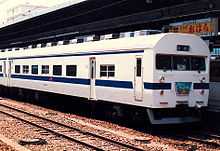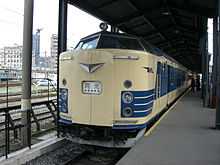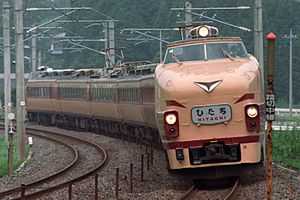715 series
| 715 series | |
|---|---|
|
715-0 series train at Hizen-Yamaguchi Station, 1987 | |
| In service | 1984–1998 |
| Manufacturer | JNR |
| Number built | 108 vehicles (27 sets) |
| Number in service | None |
| Number preserved | 1 vehicle |
| Formation | 4 cars per trainset |
| Operator |
JNR (1984-1987) JR East, JR Kyushu (1987-1998) |
| Depot(s) | Minami-Fukuoka, Sendai |
| Specifications | |
| Car body construction | Steel |
| Car length | 20,500 mm (67 ft 3 in) |
| Width | 2,950 mm (9 ft 8 in) |
| Doors | 2 per side |
| Maximum speed | 100 km/h (60 mph) |
| Traction system | Resistor control |
| Electric system(s) |
20 kV AC (60 Hz) (715-0 series) 20 kV AC (50/60 Hz) (715-1000 series) |
| Current collection method | Overhead catenary |
| Track gauge | 1,067 mm (3 ft 6 in) |
The 715 series (715系) was an electric multiple unit (EMU) train type introduced in February 1984 by Japanese National Railways (JNR), and later operated by East Japan Railway Company (JR East) and Kyushu Railway Company (JR Kyushu) on local services in Japan. They were converted from former 581/583 series sleeping car EMUs.[1]
Operations
12 4-car 715-0 series sets converted from former 581 series EMU cars were introduced from February 1984 on Nagasaki Main Line and Sasebo Line local services in Kyushu alongside new 713 series EMUs.[1]
15 4-car 715-1000 series sets converted from former 581/583 series EMU cars were introduced from March 1985 on Tōhoku Main Line local services in the Sendai area.[1]
Formations
715-0 series

The 12 JR Kyushu 4-car sets based at Minami-Fukuoka Depot were formed as shown below. Sets NM101–110 had a KuHa 715-100 converted cab car at one end, while sets NM111–112 had converted cab cars at both ends.[2]
Sets NM101–110
| Designation | Tc | M | M' | Tc' |
|---|---|---|---|---|
| Numbering | KuHa 715-100 | MoHa 715 | MoHa 714 | KuHa 715 |
Sets NM111–112
| Designation | Tc | M | M' | Tc' |
|---|---|---|---|---|
| Numbering | KuHa 715-100 | MoHa 715 | MoHa 714 | KuHa 714 |
The MoHa 714 cars were each fitted with one pantograph.[2]
715-1000 series

The 15 JR East 4-car sets (N1–15) based at Sendai Depot were formed as follows.[2]
| Designation | Tc | M | M' | Tc' |
|---|---|---|---|---|
| Numbering | KuHa 715-1100 | MoHa 715-1000 | MoHa 714-1000 | KuHa 715-1000 |
The MoHa 714 cars were each fitted with one pantograph.[2]
-

KuHa715
-

MoHa714
-

MoHa715
-

KuHa715-100
Interior
-

Interior of preserved KuHa 715-1, January 2007
Rebuilding
The sets were rebuilt from surplus former 581/583 series EMU cars at JNR factories in Tsuchisaki (Akita), Kōriyama (Fukushima), Mattō (Ishikawa), and Kokura (Kitakyūshū). Rebuilding work involved removing the upper sleeper berths, adding longitudinal bench seating at the ends of cars, increasing the number of doorways, reducing the number of toilets and washing areas, and the addition of slab-front cab ends to some former intermediate cars.[1]
715-0 series
| Rebuilt car | Former identity | Modification details |
|---|---|---|
| KuHa 715 | KuHaNe 581 | Doorway added |
| KuHa 715-100 | SaHaNe 581 | Driving cab added, toilet removed |
| KuHa 714 | SaHaNe 581 | Driving cab added, |
| MoHa 714 | MoHaNe 580 | Doorway added, one pantograph removed, toilet removed |
| MoHa 715 | MoHaNe 581 |
715-1000 series
| Rebuilt car | Former identity | Modification details |
|---|---|---|
| KuHa 715-1000 | KuHaNe 581 | Doorway added |
| KuHa 715-1100 | SaHaNe 581 | Driving cab added, toilet removed |
| MoHa 714-1000 | MoHaNe 582 | Doorway added, one pantograph removed, toilet removed |
| MoHa 715-1000 | MoHaNe 583 |
History
The JR East 715-1000 series sets were withdrawn from revenue service on 13 March 1998.[2]
The remaining JR Kyushu 715-0 series sets were finally withdrawn from service on 26 March 1998.[2]
Preserved examples

KuHa 715-1 is preserved at the Kyushu Railway History Museum in Kitakyushu, restored cosmetically to its original identity of KuHaNe 581-8.[3]
See also
- 419 series, similar EMU used in the Hokuriku region of Japan
References
- ↑ 1.0 1.1 1.2 1.3 JR全車輛ハンドブック'92 [JR Rolling Stock Handbook 1992]. Japan: Neko Publishing. 1992.
- ↑ 2.0 2.1 2.2 2.3 2.4 2.5 JR電車編成表 '98夏号 [JR EMU Formations - Summer 1998]. Japan: JRR. July 1998. ISBN 4-88283-029-9.
- ↑ Sasada, Masahiro (September 2012). 国鉄&JR保存車大全 [JNR & JR Preserved Rolling Stock Complete Guide]. Tokyo, Japan: Ikaros Publications Ltd. p. 45. ISBN 978-4863206175.
| |||||||||||||||||||||||||||||||||||||
| |||||||||||||||||||||||||||||||||||||
| |||||||||||||||||||||||||||||


